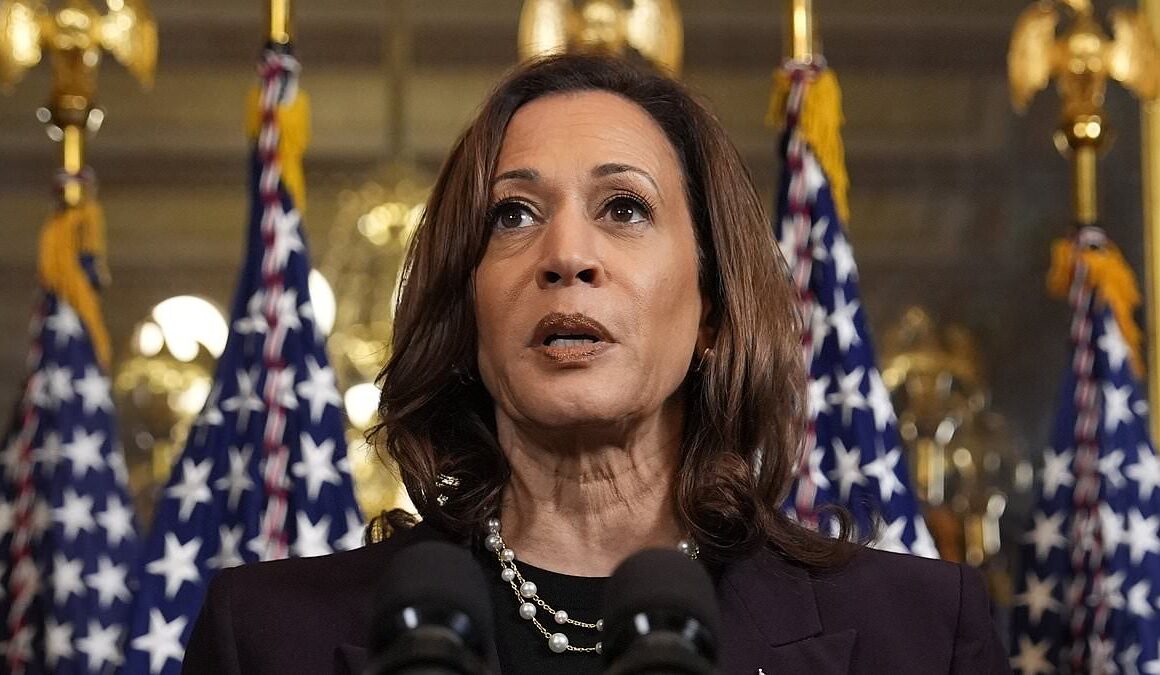Israeli Prime Minister Benjamin Netanyahu was reportedly irked at Vice President Kamala Harris‘ ‘critical’ tone in the statement she made Thursday after their meeting.
Axios cited Israeli officials who said Netanyahu and his team were caught off guard by the likely Democratic nominee’s comments where she both expressed support for Israel but condemned the ‘dire humanitarian situation’ in Gaza.
Harris made rare remarks after a meeting with a world leader, as she’s stepped up her role in the White House and the campaign trail this week as the Democrats’ likely presidential nominee.
President Joe Biden also met with Netanyahu Thursday – and allowed press in at the top of the meeting – but made no public remarks in its aftermath, instead allowing his VP to have the last word.
‘Harris’ statement after the meeting was much more critical than what she told Netanyahu in the meeting,’ one Israeli official claimed to Axios.

Israeli Prime Minister Benjamin Netanyahu (left) was reportedly irked at Vice President Kamala Harris’ (right) ‘critical’ tone in the statement she made Thursday after their meeting
The official said that Netanyahu was upset that Harris talked about the ceasefire-hostage deal as the way the war would end.
Netanyahu wants to be able to continue fighting after the deal is implemented.
The Israeli official also told Axios that the prime minister was upset that Harris criticized Israel publicly about the killing of Palestinian civilians and the overall humanitarian crisis in Gaza, especially amid the hostage deal negotations.
‘When our enemies see the U.S. and Israel are aligned it increases the chances for a hostage deal and decreases the chances for a regional escalation,’ the official said.
‘When there is such daylight it pushes the deal further away and brings a regional escalation closer. We hope that Harris’ public criticism of Israel won’t give Hamas the impression that there is daylight between the U.S. and Israel and as a result make it harder to get a deal,’ the official added.
A Harris aide told Axios they didn’t know what the Israeli officials were talking about and characterized the meeting with Netanyahu as ‘serious and collegial.’
Harris, herself, told reporters that it was a ‘frank and constructive’ meeting.
‘I just told Prime Minister Netanyahu, it was time to get this deal done,’ she said. ‘So to everyone who has been calling for a ceasefire, and to everyone who yearns for peace. I see you and I hear you: Let’s get this deal done.’
The vice president started her statement by talking about how she had been a backer of Israel since her youth and then segued into the ‘dire humanitarian situation’ in Gaza.

Harris made rare remarks after a meeting with a world leader, as she’s stepped up her role in the White House and the campaign trail this week as the Democrats’ likely presidential nominee
‘From when I was a young girl, collecting funds to plant trees for Israel, to my time in the United States Senate and now at the White House, I’ve had an unwavering commitment to the existence of the State of Israel, to its security, and to the people of Israel,’ Harris said.
‘I’ve said it many times, but it bears repeating: Israel has a right to defend itself,’ she continued. ‘And how it does so matters.’
She said she expressed to Netanyahu ‘my serious concern about the scale of human suffering and Gaza including the death of far too many innocent civilians.’
‘And I made clear my serious concern about the dire humanitarian situation there, with over two million people facing high levels of food insecurity and half a million people facing catastrophic levels of acute food insecurity,’ Harris continued.
‘What has happened in Gaza over the past nine months is devastating,’ the vice president noted.
As the likely Democratic nominee, Harris has to take into account the thorny politics of the Gaza war with members of her party, as the progressive left has expressed outrage with how Palestinian civilians have been treated by IDF forces.
Palestinian health authorities have estimated around 39,000 people, mostly civilians, have died since the war started in the aftermath of Hamas‘ brutal terror attack on Israel on October 7.
Hamas militants killed around 1,197 Israelis, mostly civilians, in that assault.
During Netanyahu’s address before Congress Wednesday, Democratic Rep. Rashida Tlaib held up a sign that read ‘war criminal’ on one side and ‘guilty of genocide’ on the other.
The White House has pushed back on terms like ‘war criminal’ and ‘genocide.’
‘The images of dead children and desperate hungry people fleeing for safety, sometimes displaced for the second, third or fourth time. We cannot look away in the face of these tragedies,’ Harris told reporters Thursday.
‘We cannot allow ourselves to become numb to the suffering and I will not be silent,’ she said.
She then outlined what’s on the table for there to be a ceasefire and for the Israelis to get their hostages back.
Before concluding her brief remarks, she asked Americans to view the war in shades of gray.
‘It is important for the American people to remember the war in Gaza is not a binary issue,’ she stated. ‘However, too often the conversation is binary when the reality is anything but.’
‘So I asked my fellow Americans to help encourage efforts to acknowledge the complexity, the nuance, and the history of the region,’ she continued. ‘Let us all condemn terrorism and violence. Let us all do what we can to prevent the suffering of innocent civilians and let us condemn anti-semitism, Islamophobia and hate of any kind.’
It’s too early to tell if Harris’ tough tone, but quest for nuance, will be enough to win back over the younger voters Biden was bleeding due to his support for Israel.
The ‘uncommitted’ movement saw Biden drained of around 101,000 potential votes in the key swing state of Michigan, as Democrats in the primary made that choice to express their displeasure with the president’s foreign policy stance on Gaza.
Prior to her new role as Democratic presidential candidate, Harris had already been more nuanced than Biden when discussing the war.
In March, she called for a ceasefire deal to end the ‘immense suffering’ of the Palestinians and was critical of Israel for insufficiently getting aid into Gaza.
This week she kept an event with the historically black Zeta Phi Beta sorority in Indiana on her schedule, instead of being in Washington for Netanyahu’s congressional address.
She did, however, rush back from Houston – where she had addressed the American Federation of Teachers Thursday morning – for her afternoon meet-and-greet with the Israeli prime minister.







